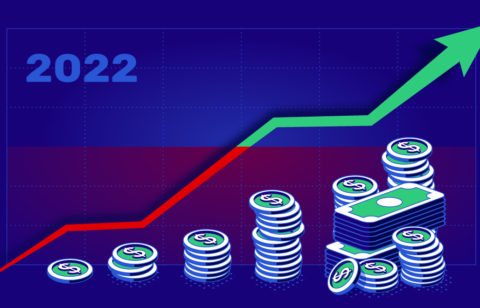Slowly but surely, the weather is starting to get warmer. The night doesn’t come around that early in the day anymore. And maybe you’re already planning for Easter. That can mean one thing only: Spring is right around the corner! March marks the end of winter and the beginning of spring — a great time to do a spring clean-up. Let’s go into spring clean and fresh. This could mean cleaning out your garage or getting rid of old clothes in your closet. However, people’s finances are often overlooked during such a clean-up, and it’s an important part of life to stay on top of.
Let’s change that — and let us help you with your financial spring clean-up so you can get a fresh start and enjoy this beautiful season in all its glory. No stress about money, because you just know your finances are in check. To help you get there, we’ll give you an easy-to-follow 8-point checklist below. At the end of this checklist, we hope you’ll feel more on top of your finances and ready for a beautiful and comfy spring. Ready? Let’s start!
Reflect on your New Year’s Resolutions
If you’re reading this article on cleaning up your finances, there’s a good chance you set New Year’s resolutions around your financial situation. Maybe you created a budget back in January, set a savings goal or made it your #1 priority to pay off any high-interest debt this year. Now, more than 2 months later, it’s a great time to reflect on those New Year’s resolutions.
Are you still on track? If so, you’re probably on top of your financial situation already and you don’t need to clean up that much with your finances anyway. This checklist will be a great tool to quickly go through your current situation and see if you can finetune anything for an even smoother year.
However, if you feel you’re not on track with your New Year’s resolutions, this checklist will help you get back in the saddle. Remember why you’ve set your New Year’s resolutions in the first place. You’ve written them down for a good reason, right? How come you’ve strayed from the path? Sure, life happens, we know. But keeping your finances in check is important for your future, your kids’ future and your overall mental well-being. Let’s get a grip on your situation again — this checklist will help you do just that.
#1 – Take a Look at Your Spending in the Past Few Months
The first thing to check is where your money went these past few months. Go into your banking app and look through all transactions in 2024 one by one. Sounds boring, but this will probably take just 15 minutes and is a very powerful exercise. This helps you get a feel for where your money went and identify any unnecessary expenses that can be eliminated. Also, with this information, you can evaluate your current budget and make any necessary adjustments.
This step includes critically reviewing any subscriptions or memberships you may have. Did you pay for any that you haven’t used these past months? Get rid of them!
#2 – Review Your Budget
This brings us to point 2: Review your budget. Are you still on track with your budget? Are there categories you’ve structurally spent more on these past few months? And what about categories you’ve spent significantly less money on than expected?
If you’re spending more than planned, look for ways to cut costs, or maybe you need to adjust your budget slightly for it to be in line with your financial goals. If you’re spending less than planned on certain categories, check if you can put this money to good use, such as paying off high-interest debt or putting it in an emergency fund.
#3 – Check Your Debt Situation
If you have any debt, how much is it? Are you paying off your debt as planned, prioritizing high-interest debt and working your way down to lower-interest debt? If so, great! If not, let’s fix that. If you feel overwhelmed by or out of control of your debt, consider consolidating your debt or negotiating lower interest rates. This makes your debt more manageable and saves you money on interest payments. If you need help, know that National Debt Relief is here for you. We can help you get back control of your situation. See for yourself how it works here.
#4 – Build Your Emergency Fund
How’s your emergency fund doing? It’s a good strategy to have at least 3 to 6 months’ worth of living expenses saved, in case anything unexpected happens. Losing your job, getting in an accident, a sudden medical issue — these are all things that may happen and can become costly very quickly. Having savings for emergencies like these allows you to take action whenever something unexpected happens. Plus, it gives you peace of mind, knowing that you have savings dedicated to covering anything unexpected.
#5 – Review Your Investments
If your debt is paid off and your emergency fund is fully stacked, you’re probably investing at least some of your money in the stock market (maybe through a dedicated retirement account — see point 7 below). That’s great, because that means your hard-earned money is working for you and your future! Now, let’s review your current portfolio. Is it still in line with your long-term financial goals or do you need to adjust the course?
For most people, the route to consider is index-fund investing. It’s relatively low-risk, you set it and forget, and when you hit your retirement age you have a nice nest egg saved.
#6 – Check Your Credit Report
Get a copy of your credit report from each of the major credit bureaus and thoroughly review those reports. According to CNBC, one out of every three Americans’ credit reports contain errors, so there might be errors in yours too negatively impacting your credit score.
Go to Annual Credit Report and request your free credit report. Then, check them for any credit errors. Are there accounts you don’t recognize? Incorrect account statuses? Any fraudulent activity in your name? If you happen to find an error, you can file a dispute with the credit bureau. The credit bureau is required by law to respond to your claim within 30 days. Fixing errors in due time can help save you a lot of money in interest charges and get you better loan terms, hence it’s important to make this part of your spring clean-up!
#7 – Optimize Your Taxes
The best thing you can do to optimize your taxes is to maximize contributions to your retirement accounts such as your IRA and 401(k). How are you doing with those?
Also, there’s a good chance you’ve filed your tax return by now (if not, this is your reminder to file your return before April 15th to avoid penalties and interest!). You can expect to get your tax refund, at most, 28 calendar days after you’ve filed your return. Have you picked a destination for your tax return already? Put it to good use: Pay off debt, boost your emergency fund or use it to invest for the future.
#8 – Review Your Financial Goals
When you’ve gone through all previous steps in this checklist, you’ll go into spring with a solid grasp of the state of your finances and a cleaned-up financial situation. Now it’s time to review your financial goals. Are you on track to accomplish all your financial goals this year? And what about those 5-year goals, if you have them? Do you need to change (part of) your strategy for this year? Or are you doing even better than expected? Being honest with yourself is the most important thing you can do in this process.
Let’s go into the new season with a fresh start!
With spring coming up soon, it’s a great time to clean up your financial situation and go into the new season with a fresh start. That’s why in this article, we’ve given you a useful 8-point checklist to help you with your financial spring clean-up. Also, it’s still early enough in the year to adjust course if you see you’re not on track to accomplish your New Year’s resolutions.
Check what you’ve spent these past few months and compare this with your budget. Then, move on to putting your money to work. How? By paying off any high-interest debt you may have, making sure you’re working toward a sufficiently large emergency fund, and are building a nest egg for the future. Use this checklist as a reminder to check (and fix) your credit report for errors. And don’t forget to optimize your taxes!
Put this checklist to good use and make sure you go into the new season with a fresh start. Not only will this greatly benefit your financial situation, but you’ll also have the peace of mind of knowing that you’re in control of your wallet, not the other way around. Happy spring!







